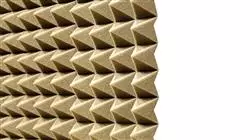University certificate
Scientific endorser

The world's largest faculty of engineering”
Introduction to the Program
Raise your professional potential in the world of Acoustic Engineering thanks to this 100% online Masters Degree”

Research and innovation in the field of Acoustics has been a constant. In that sense, technologies have played a transcendental role in the sound of spaces such as theaters, halls, buildings or with the ability to isolate noise in different environments. All this, sponsored by technological progress and regulatory changes in favor of respect for the environment.
In this scenario, the engineer who decides to develop his professional career in this field must possess in-depth theoretical knowledge and put it into practice in sectors as varied as construction, automotive, aviation, or in areas involved in the study of the effects or improvement of the materials for sound reinforcement. In response to this reality, this Masters Degree in Acoustic Engineering was developed by engineering professionals with extensive experience in this field.
An academic proposal that will lead students to delve into acoustic physics, to advance in psychoacoustics, advanced acoustic instrumentation, to delve into acoustic instrumentation, advances in systems and signal processing or recording systems and recording techniques in studio. All this, moreover, in a dynamic way thanks to pedagogical resources such as video summaries, high quality multimedia pills, specialized readings and case studies. }
Additionally, thanks to the Relearning, system, based on the reiteration of key concepts throughout the syllabus, the graduate will be able to significantly reduce the long hours of study and achieve a much simpler and more effective learning process.
Undoubtedly, the student is faced with a first class academic option that is also distinguished by its 100% flexible methodology. And the fact is that, all that is required is an electronic device with Internet connection to visualize, at any time of the day, the content hosted on the virtual platform. A unique opportunity that only TECH, the largest digital university in the world, can offer you.
A first class academic proposal developed by TECH, a Google Premier Partner institution”
This Masters Degree in Acoustic Engineering contains the most complete and up-to-date program on the market. The most important features include:
- Development of case studies presented by experts in Acoustics engineering
- The graphic, schematic and practical contents of the book provide technical and practical information on those disciplines that are essential for professional practice
- Practical exercises where the process of self-assessment can be used to improve learning
- Its special emphasis on innovative methodologies
- Theoretical lessons, questions to the expert, debate forums on controversial topics, and individual reflection assignments
- Content that is accessible from any fixed or portable device with an Internet connection
Solve the main problems in audio recording and guarantee quality. All of this, with knowledge acquired from the comfort of your home”
The program's teaching staff includes professionals from the sector who bring the experience of their work to this training, as well as recognized specialists from reference societies and prestigious universities.
Its multimedia content, developed with the latest educational technology, will allow the professional a situated and contextual learning, that is, a simulated environment that will provide an immersive training programmed to train in real situations.
The design of this program focuses on Problem-Based Learning, in which the professional will have to try to solve the different professional practice situations that will arise throughout the academic course. For this purpose, the student will be assisted by an innovative interactive video system created by renowned experts.
You have a library of multimedia resources accessible 24 hours a day, 7 days a week"

Get an effective specialization in Architectural Acoustics and take a step further in your sound insulation projects. Enroll now"
Why study at TECH?
TECH is the world’s largest online university. With an impressive catalog of more than 14,000 university programs available in 11 languages, it is positioned as a leader in employability, with a 99% job placement rate. In addition, it relies on an enormous faculty of more than 6,000 professors of the highest international renown.

Study at the world's largest online university and guarantee your professional success. The future starts at TECH”
The world’s best online university according to FORBES
The prestigious Forbes magazine, specialized in business and finance, has highlighted TECH as “the world's best online university” This is what they have recently stated in an article in their digital edition in which they echo the success story of this institution, “thanks to the academic offer it provides, the selection of its teaching staff, and an innovative learning method aimed at educating the professionals of the future”
A revolutionary study method, a cutting-edge faculty and a practical focus: the key to TECH's success.
The most complete study plans on the university scene
TECH offers the most complete study plans on the university scene, with syllabuses that cover fundamental concepts and, at the same time, the main scientific advances in their specific scientific areas. In addition, these programs are continuously being updated to guarantee students the academic vanguard and the most in-demand professional skills. In this way, the university's qualifications provide its graduates with a significant advantage to propel their careers to success.
TECH offers the most comprehensive and intensive study plans on the current university scene.
A world-class teaching staff
TECH's teaching staff is made up of more than 6,000 professors with the highest international recognition. Professors, researchers and top executives of multinational companies, including Isaiah Covington, performance coach of the Boston Celtics; Magda Romanska, principal investigator at Harvard MetaLAB; Ignacio Wistumba, chairman of the department of translational molecular pathology at MD Anderson Cancer Center; and D.W. Pine, creative director of TIME magazine, among others.
Internationally renowned experts, specialized in different branches of Health, Technology, Communication and Business, form part of the TECH faculty.
A unique learning method
TECH is the first university to use Relearning in all its programs. It is the best online learning methodology, accredited with international teaching quality certifications, provided by prestigious educational agencies. In addition, this disruptive educational model is complemented with the “Case Method”, thereby setting up a unique online teaching strategy. Innovative teaching resources are also implemented, including detailed videos, infographics and interactive summaries.
TECH combines Relearning and the Case Method in all its university programs to guarantee excellent theoretical and practical learning, studying whenever and wherever you want.
The world's largest online university
TECH is the world’s largest online university. We are the largest educational institution, with the best and widest online educational catalog, one hundred percent online and covering the vast majority of areas of knowledge. We offer a large selection of our own degrees and accredited online undergraduate and postgraduate degrees. In total, more than 14,000 university degrees, in eleven different languages, make us the largest educational largest in the world.
TECH has the world's most extensive catalog of academic and official programs, available in more than 11 languages.
Google Premier Partner
The American technology giant has awarded TECH the Google Google Premier Partner badge. This award, which is only available to 3% of the world's companies, highlights the efficient, flexible and tailored experience that this university provides to students. The recognition as a Google Premier Partner not only accredits the maximum rigor, performance and investment in TECH's digital infrastructures, but also places this university as one of the world's leading technology companies.
Google has positioned TECH in the top 3% of the world's most important technology companies by awarding it its Google Premier Partner badge.
The official online university of the NBA
TECH is the official online university of the NBA. Thanks to our agreement with the biggest league in basketball, we offer our students exclusive university programs, as well as a wide variety of educational resources focused on the business of the league and other areas of the sports industry. Each program is made up of a uniquely designed syllabus and features exceptional guest hosts: professionals with a distinguished sports background who will offer their expertise on the most relevant topics.
TECH has been selected by the NBA, the world's top basketball league, as its official online university.
The top-rated university by its students
Students have positioned TECH as the world's top-rated university on the main review websites, with a highest rating of 4.9 out of 5, obtained from more than 1,000 reviews. These results consolidate TECH as the benchmark university institution at an international level, reflecting the excellence and positive impact of its educational model.” reflecting the excellence and positive impact of its educational model.”
TECH is the world’s top-rated university by its students.
Leaders in employability
TECH has managed to become the leading university in employability. 99% of its students obtain jobs in the academic field they have studied, within one year of completing any of the university's programs. A similar number achieve immediate career enhancement. All this thanks to a study methodology that bases its effectiveness on the acquisition of practical skills, which are absolutely necessary for professional development.
99% of TECH graduates find a job within a year of completing their studies.
Master's Degree in Acoustic Engineering
Acoustic engineering creates more harmonious spaces, enhances sound quality, and protects auditory health. Are you ready to take a quantum leap in your academic and professional career? TECH Global University offers you a unique opportunity through the Master’s Degree in Acoustic Engineering, delivered online by its prestigious School of Engineering. This cutting-edge program is designed to elevate your skills and open the door to a world of possibilities in the field of acoustics. Are you ready to learn from the best in the field? The faculty team is composed of experts with extensive experience in both research and the practical application of acoustic principles. They will guide you throughout the program, providing solid knowledge and practical tools that will allow you to stand out in the field of acoustic engineering. During the Master’s program, you will explore a wide range of topics—from architectural and environmental acoustics to audio technology and musical acoustics. You will also learn to use specialized software and state-of-the-art equipment to analyze and solve complex acoustic challenges.
Highest educational standards in acoustic engineering
Can you imagine earning a postgraduate certificate from a globally recognized institution? This program is designed to prepare you for a variety of professional fields, including the design of acoustically optimized spaces, environmental noise control, and the development of high-quality audio products, among others. Acoustic engineering plays a vital role in improving urban soundscapes and optimizing sound systems in concert halls and theaters. With our Master’s Degree in Acoustic Engineering, you will be fully equipped to face real-world challenges and contribute to societal well-being through innovative sound solutions. Take advantage of this unique opportunity to study with us and gain the skills that will open the doors to a successful and impactful career. Enroll now and prepare for a future full of possibilities.







